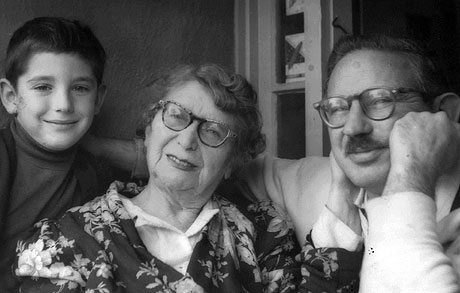MTT revisits Thomashefsky tribute with a tighter, more focused evening

A young Michael Tilson Thomas with his grandmother Bessie Thomashefsky and father Ted Thomas.
The New World Symphony opened a three-day run of The Thomashefskys, Michael Tilson Thomas’ biographical tribute to his grandparents Friday night at the New World Center in Miami Beach. A substantially revised version of the production presented at the Lincoln Theatre in 2007, this musical revue traces the lives and careers of Boris and Bessie Thomashefsky, the stalwart actor-producers of New York’s thriving Yiddish theater in the late nineteenth and early twentieth centuries.
For Tilson Thomas, this venture has been a labor of love, encompassing a decade of research. To audience members of a certain age who recall the twilight years of Yiddish theatrical productions, this show is a nostalgic journey. But more broadly — in addition to offering insight into Tilson Thomas’ own artistic roots — this musical biography is a history lesson on the evolution of American musical theater, and a primer on early European models paving the way for the exuberant sounds of vaudeville and the Jazz Age.
The Thomashefskys were Ukrainian immigrants with big dreams and an ambitious vision of theater as both entertainment and educational device for their ethnic audiences to learn about America. Despite a fitful personal relationship, their theatrical ventures proved historic. Although best known for musical comedies, they produced adaptations of European classics and plays about anti-Semitism and other controversial issues of their day. The eventual breakup of their marriage and the decline of ethnic-based theater would find Boris as a producer of cabaret and send Bessie to Hollywood.
The early Thomashefsky productions in the 1880’s and 90’s encompassed the operettas of Russian composer Abraham Goldfaden. Combining Slavic melodies, Hassidic chants and European operetta, Goldfaden produced unsophisticated scores, devoid of memorable melodies but tailored to the masses. Excerpts from Koldunye (The Witch) were musically derivative of Donizetti, Johann Strauss and folk tunes. Later productions featured scores by Lithuanian immigrant Joseph Rumshinsky whose music caught the rhythmic bounce of New York’s crowded streets and Lower East Side neighborhoods, paving the way for such distinctive American talents as George and Ira Gershwin and Irving Berlin, who attended Thomashefsky productions in their youth.
Some of the evening’s liveliest, most toe-tapping tunes came from the 1909 musical A Little Spark of Jewishness by Arnold Perlmutter and Herman Wohl. Here ethnic traditions and American showbiz fused for unpretentious entertainment. Long Live Columbus from the team’s The Green Millionaire (1916) was a hilarious vaudeville routine about two impoverished Jewish immigrants who claim to be successful in their new land. Boris Thomashefsky’s extramarital affairs became fodder for Who Do You Suppose Married My Sister? Thomashefsky! by Nora Bayes and Jack Norworth, the team that wrote Shine On Harvest Moon. This catchy ditty was sung by Tilson Thomas himself with the flair of a born song- and-dance man.
Staged by veteran Broadway director-choreographer Patricia Birch, the production has been considerably tightened, now flowing seamlessly between the protagonists’ intimate melodramatic scenes and musical selections from their theatrical careers. Only static problems with Tilson Thomas’ body microphone Friday night marred a well-rehearsed performance. With thirty-two members of the New World Symphony summoning the sound of an East Side pit band, Tilson Thomas led snappy arrangements that channeled a bygone era.
Judy Blazer played a strong willed Bessie Thomashefsky. Her trained theater voice seemed happiest when she could belt an uptempo number to the rafters. Shuler Hensley was an arrogant, egotistical Boris with a large baritone voice to match. Trained at San Francisco Opera’s famous Merola program, Eugene Brancoveanu offered a more subtle, artful baritone, particularly effective in the title song from Rumshinsky’s The Way Men Love (1919). Only Ronit Widmann-Levy seemed at sea, her soprano undermined by an unreliable high register and wide vibrato.
The production is being filmed by PBS for future presentation on the Great Performances series.
The Thomashefskys will be repeated 7:30 p.m. Saturday and 2 p.m. Sunday at the New World Center in Miami Beach. 305-673-3331, www.nws.edu.
Posted in Performances
Leave a Comment
Sat Apr 16, 2011
at 9:19 am
No Comments